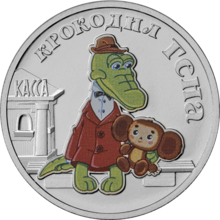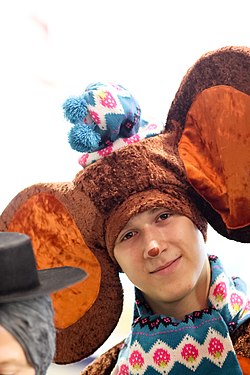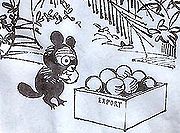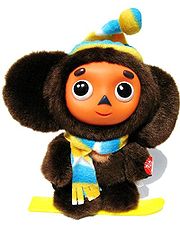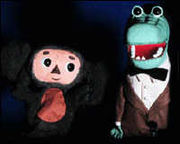From Wikipedia, the free encyclopedia
Cheburashka (Russian: Чебурашка), also known as Topple in earlier English translations, is a fictional character created by Soviet writer Eduard Uspensky in his 1965 children’s book Gena the Crocodile and His Friends. The character subsequently appeared as the protagonist in a series of stop-motion animated films by Roman Kachanov (Soyuzmultfilm studio), the first of which was made in 1969,[1][2][3] with songs composed by Vladimir Shainsky.[4]
Story[edit]
Cheburashka is an iconic Russian classic cartoon character who later became a popular character in Russian jokes (along with his friend, Gena the Crocodile). According to the creator of the character, Eduard Uspensky, Cheburashka is an «animal unknown to science», with large monkey-like ears and a body resembling that of a cub, who lives in a tropical forest. He accidentally gets into a crate of oranges, eats his fill, and falls asleep. The crate is eventually delivered to a grocery store in an unnamed Russian city (hinted to be Moscow), where the rest of the main story unfolds.[5]
The puzzled store manager finds the creature in the crate when he opens it, and takes him out and sits him on the table. The creature’s paws are numb after staying in the crate for so long, and he tumbles down (чебурахнулся, cheburakhnulsya, a Russian colloquialism meaning «tumbled») from the table, onto the chair, and then onto the floor. This inspires the store manager to name him Cheburashka. Words with this root were archaic in Russian; Uspensky gave them a new lease on life. (The Explanatory Dictionary of the Live Great Russian language of Vladimir Dahl gives the meaning of «cheburashka» as another name for the roly-poly toy.[6])
Animated series[edit]
- 1. Gena the Crocodile (1969)
- 2. Cheburashka (1971)
- 3. Shapoklyak (1974)
- 4. Cheburashka Goes to School (1983)
- Cheburashka Arere? (GoHands, Japan, 2009)
Live-action film[edit]
- Cheburashka (Russia, 2023)
Characters[edit]
-
Cheburashka played by an actor
Cheburashka and friends[edit]
Cheburashka is male, has a bear-like body, and is about the size of a 5-year-old child. He is a toddling creature with huge round ears on the side of his head that droop when he is discouraged. He has feet without legs, big black eyes, a snub nose. His voice is high-pitched and childlike. Cheburashka is an optimist as he only sees the best in people and is chirpy even in the gloomiest situation. Sergei Kapkov, animation historian and managing editor of Soyuzmultfilm, has said that Cheburashka «is absolutely useless and hopeless. He is like a stranger who doesn’t understand a thing but just has one global idea, and that is to make friends and have others … make friends with each other.»[7]
After being turned down by the zoo as an «animal unknown to science,» Cheburashka gets hired as a window display for a discount store selling factory seconds because he resembles one, residing in a phone booth. In the tale, he befriends an anthropomorphic crocodile named Gena, who wears a hat, a bow tie, and a coat, and plays the accordion. Gena works in a zoo as a zoo animal. Gena’s favorite songs are «Such a Pity that One’s Birthday Happens Only Once a Year» and «The Blue Train Car», both of which are extremely popular with children.
Antagonist[edit]
Cheburashka and Gena have their adventures made more difficult by a character named «Старуха Шапокляк» (Old Lady Shapoklyak). She is a mischievous but charming old lady. Shapoklyak is tall and thin, wears a hat, a dark-coloured dress, and bloomers, and carries around a pet rat, Lariska, in her purse to help her play pranks on people, though near the end of some stories she turns around and helps the protagonists. The chorus of her theme song contains her motto, «One won’t ever get famous for good deeds.»
Copyright issues[edit]
Cheburashka in 1965, in the first edition of the book.
The rights to the Cheburashka character and image have been heavily debated in court.[8] In 1994, Eduard Uspensky (the writer) copyrighted the character’s name and image and proceeded to sell the rights to various countries. Leonid Shvartsman, the art director of the animated films, has tried to prove in court that he was the creator of Cheburashka’s visual appearance and that this copyright should be separate from the rights for the literary character. On 13 March 2007, Shvartsman and his lawyer lost a 4.7 million ruble lawsuit against BRK Cosmetics and Eduard Uspensky. Shvartsman alleged that Uspensky sold the rights to the Cheburashka image (which was allegedly not his to sell) to BRK Cosmetics, which used it on packets of toothpaste. The defence argued that the artist who drew the character for the packets had never seen the animated films and, despite the fact that the character on the packets was an exact copy of the one in the animated films, had created the character himself after the impressions left from reading Uspensky’s books. Vladimir Entin, defender of Shvartsman’s interests, suspected that the jury had to have been bribed in order to hand such an unlikely verdict, but admits that there is no proof.[9]
Cheburashka sightings[edit]
The Antonov An-72 is said to resemble Cheburashka when viewed from the front.
Cheburashka is now a staple of Russian cartoons, and there are several licensed products on the market, such as children’s joke books and stuffed toys. He is also one of the few Russian animation characters to be the subject of numerous Russian jokes and riddles.
The word «Cheburashka» is also used in a figurative sense to name objects that somehow resemble the creature (such as an An-72 aircraft which, when seen from the front, resembles the character’s head) or are just as pleasing as it is (e.g. a colloquial name for a small bottle of lemonade – from the brand name «Cheburashka»).
Cheburashka was also chosen as the official mascot with the main mascots for the Russian Olympic Team in the following games:
- 2004 Summer Olympics in Greece
- 2006 Winter Olympics in Turin, Italy (with white fur)
- 2008 Summer Olympics in Beijing, China (with red fur)
- 2010 Winter Olympics in Vancouver, Canada (with blue fur)
Cheburashka also became known in some countries outside the former Soviet Union (and of the Soviet Bloc). He became very popular in Japan after an animated film series about him was shown in 15 cinemas all over Japan and was watched by about 700,000 between summer 2001 and spring 2002. In 2008, the Cheburashka films (as part of the «Ghibli Museum Library») were made available to Japanese cinemas[10] on the same date as Hayao Miyazaki’s Ponyo on the Cliff by the Sea.[11] An English-dubbed edition of at least one of the animated films was released in 1987, titled The Adventures of Charlie and Cubby.[12]
«Drutten och Gena», Sweden[edit]
Screenshot from «Drutten och Gena»
In the 1970s a series of children’s television shows, radio shows, records and magazines were produced in Sweden with the characters Drutten and crocodile Gena. These two characters were based on a couple of Cheburashka and Gena dolls bought on a trip to the Soviet Union, so they were visually identical to Cheburashka and Gena. («Drutten» means «one who tumbles down», as one meaning of the Swedish colloquial verb «drutta» is «to fall or tumble down».)
But that is where the similarity ends. The two characters sang and told different stories from those in the USSR, lived on a bookshelf rather than in a city and are hand puppets operated in live action rather than stop motion. Only occasionally Swedish public service TV would broadcast a segment of the Russian original, dubbed in Swedish. So, while many Swedes may visually recognize Cheburashka, they will generally not associate these characters with the ones Russian children know.
Collectibles[edit]
Cheburashka dolls and other collectibles are produced in Russia, Japan and China. United States National Champion figure skater Johnny Weir is known to be an avid collector of Russian Cheburashka items.[13]
The white and red Olympic mascots were made in three sizes – 14 cm, 18 cm and 27 cm – and wear a sponsor’s jersey with the «Bosco Sport» logo on the chest.
T-shirts with Cheburashka are common, including several versions with the character drawn as Alberto Korda’s Che Guevara photograph, labeled «Che Burashka».
Tommy Cash, Estonia[edit]
Estonian musician Tommy Cash (rapper) has compared himself to the beloved character, stating «I got huge ears, big eyes, call me Cheburashka».[14]
Cheburashka films[edit]
Ivan Maximov had said in a 2004 interview[15] that Pilot Studio had been planning to make a Cheburashka feature film and that the scenario had been written out and possibly some footage shot, but that it had been frozen for lack of funds. Cheburashka’s popularity in Japan is such that on 4 April 2006, TV Tokyo broadband issued a press announcement[16] that it (in partnership with Frontier Works) has acquired the rights to remake the Cheburashka shorts as a feature film. It is unclear if this was the project that Pilot Studio had been forced to abandon. It was announced that the film, like the original shorts, will be based on puppet animation enhanced with modern stop-motion technology and computer graphics effects (similar to the plans for the Pilot Studio film), and would be shot simultaneously in English and Russian.
In March 2009 it was announced that the new Cheburashka animation would consist of a new animated series, called Cheburashka arere?, which ran for 26 3-minute episodes. Cheburashka arere? premiered on the Nori-Suta 100% television program on 7 October 2009.
The new film, only titled Cheburashka[17] is produced by both Ffango Entertoyment[18] of South Korea and Frontier Works of Japan. Directed by Makoto Nakamura and written by both Mikhail Aldashin and Michiru Shimada. The film opened on 8 December 2010 in Japan. The film’s theme song is titled «Orange», performed by Kaela Kimura.
The compilation film of the Japanese remake shorts titled Cheburashka was released in Russia on June 15, 2014.
In September 2021, a full-length film titled Cheburashka was announced with filming beginning in Sochi, and shooting locations also planned in Moscow, Kislovodsk and Pyatigorsk. Dmitry Dyachenko directed, with Central Partnership and Yellow, Black and White producing. The film was released on January 1, 2023.[19] Cheburashka is the highest grossing film in the Russian box office history. Olga Kuzmina voiced Cheburashka, while Sergei Garmash portrayed Gena, a gardener (the film version of Crocodile Gena).[20]
See also[edit]
- History of Russian animation
- List of stop-motion films
References[edit]
- ^ «Список фильмов» (in Russian). Official E. Uspensky website. Retrieved 2009-12-11.
- ^ MacFadyen, David (2005). «Filmography – Krokodil Gena (1969)». Yellow Crocodiles and Blue Oranges: Russian Animated Film since World War Two. Montreal: McGill-Queen’s University Press. p. 236. ISBN 0-7735-2871-7
- ^ «Cheburashka Classics Archived 2011-05-12 at the Wayback Machine». Frontier Works, Inc. Retrieved 2009-12-11.
- ^ Soundtrack composer for legendary Soviet cartoon dies aged 92 TASS, December 26
- ^ Balina, Marina; Rudova, Larissa, eds. (2013). Russian Children’s Literature and Culture. Taylor & Francis. p. 166. ISBN 9781135865573.
- ^ Dahl, Vladimir (1882). «Чебурашка». The Explanatory Dictionary of the Live Great Russian language: Er-Ve (in Russian). Спб.: Изд. Т-ва М. О. Вольф. p. 603. OCLC 1661885.
- ^ Dixon, Robyn (29 May 2020). «Cheburashka was the beloved misfit of Soviet animation. It’s now a missing treasure for Russia». The Washington Post. Moscow. Retrieved 4 April 2021.
- ^ Sheveleva, Aleksandra (December 13, 2006). «Чебурашку разбирают в суде» (in Russian). BBC News Online. Retrieved 2009-12-11.
- ^ Anufrieva, Anna (13 March 2007). Как заработать на Чебурашке. Delovoy Peterburg (in Russian). Archived from the original on 22 March 2007.
- ^ «映画『チェブラーシカ』全四話完全版公式サイト». www.ghibli-museum.jp.
- ^ Takai, Shinichi. «崖の上のポニョ – スタジオジブリ|STUDIO GHIBLI». www.ghibli.jp.
- ^ «The Adventures of Charlie & Cubby (1987) – — Synopsis, Characteristics, Moods, Themes and Related – AllMovie». AllMovie. Retrieved 4 December 2017.
- ^ Johnny Weir Online: The Official Site, Q&A, July 2006, archived from the original on 4 May 2009
- ^ TOMMY CASH – PUSSY MONEY WEED, July 2021, archived from the original on 22 December 2021
- ^ Rasskazova, Tatyana (16 August 2004) «Иван Максимов: по дешевке «Симпсонов» не сделаешь Archived 2007-02-28 at the Wayback Machine» (in Russian). Ogoniok 33 (4860). Retrieved 2009-12-11.
- ^ Ozler, Levent (12 April 2006). «Cheburash : Animation Phenomenon Goes to TV Tokyo Broadband». Dexigner. Archived from the original on 16 October 2016. Retrieved 13 October 2016.
- ^ «Russia’s Cheburashka Character Gets Japanese TV Anime». Anime News Network. September 3, 2009. Retrieved 2009-12-11.
- ^ «The future looks bright for companies that moved into the Gyeonggi Digital Content Agency». Retrieved 4 December 2017.
- ^ «Съемки полнометражного фильма о Чебурашке стартовали в Сочи» [«Filming for the full-length film ‘Cheburashka’ started in Sochi]. TASS (in Russian). Retrieved 24 November 2021.
- ^ Al’perina, Susanna. «Чебурашку в полнометражном фильме озвучит Ольга Кузьмина» [«Olga Kuzmina will voice Cheburashka in the full-length film]. Rossiyskaya Gazeta (in Russian). Retrieved 25 November 2021.
External links[edit]
- Russian fan page
- Japanese official website
- Cheburashka’s Room in Poland’s Cartoons Museum
- Cheburashka’s New Adventures – After stealing hearts at the Turin Winter Olympics, the famed Soviet cartoon character is about to become a movie star in Japan (The Moscow Times. May 12, 2006)
- Cheburator: Cheburashka-themed movie images and artwork
- Cheburashka Arere? (anime) at Anime News Network’s encyclopedia
На основании Вашего запроса эти примеры могут содержать грубую лексику.
На основании Вашего запроса эти примеры могут содержать разговорную лексику.
Перевод «чебурашка» на английский
Всеми любимый лопоухий Чебурашка перед сломанной телефонной будкой.
Everyone’s favorite big-eared wonder Cheburashka in front of a broken phone booth.
Чебурашка — это система оснащения приманок, состоящая из съемной булавки и груза.
Cheburashka is a system of lure weighting that consist of a detachable snap and a weight.
Чебурашка, любимый персонаж советского мультфильма, в обстановке игры Pokémon.
Cheburashka, a beloved Soviet cartoon character, placed in a Pokémon Go setting.
Да, и то, что ты заспанный небритыш — чебурашка, это — натяжка.
Yes, and what you sleepy nebritysh — Cheburashka, is — wishful thinking.
Да, и то, что ты заспанный небритыш — чебурашка, это — натяжка.
Yes, and that you are a sleepy unshaven Cheburashka — this is a stretch of imagination.
«Ты мой заспанный Чебурашка«.
«Ты мой заспанный Чебурашка«.
Я считаю, Чебурашка, конечно, совершенно очарователен, но, что ещё более важно, он подчеркивает большое значение верной дружбы в русской культуре.
I find Cheburashka utterly charming, of course, but more importantly, it underscores the great importance of loyal friendship in Russian culture.
Во втором ролике Чебурашка стоит на фоне экрана с изображением персонажей, придуманных Э.Успенским, и благодарит писателя за их создание, счастливое детство зрителей.
In the second video Cheburashka is on the background screen with images of the characters invented by the assumption, and thanks the writer for their creation, the happy childhood of viewers.
Анна, которая всегда чутко приходит мне на помощь, когда обнаруживает мою культурную путаницу, объясняет: «Чебурашка — маленькое, похожее на медведя животное, которое было найдено в ящике с апельсинами и живёт в телефонной будке.
Anna, who always sensitively comes to my rescue when she detects my cultural confusion, explains: Cheburashka is a small, bear-like animal, who was found in a crate of oranges and lives in a telephone booth.
Её основные персонажи, Крокодил Гена и Чебурашка, получили широкую известность — сначала в СССР, а впоследствии — за рубежом.
Her main characters, Gena the Crocodile and Cheburashka, have received wide recognition — first in the Soviet Union and later abroad.
С тех пор Крокодил Гена и его маленький друг Чебурашка до глубины души захватили сердца всех детей, молодых людей и взрослых.
Since then, Gena the Crocodile and his little friend Cheburashka captured hearts of all children, young people and adults.
Они были прекрасны: Заяц и Волк, Чебурашка и крокодил Гена — эти герои любимы нами с детства.
They were great: the Hare and the Wolf, Cheburashka and crocodile Gena — these characters are loved by us since childhood.
Поэтому в тексте книги, героями которой являются, как утверждает писатель, детские игрушки самого Успенского, Чебурашка действительно предстаёт перед читателями как неизвестный тропический зверек.
Therefore, in the text of the book, the characters of which are, according to the writer, children’s toys of the Assumption, Cheburashka really appears to the reader as an unknown tropical animal.
Чебурашка родом из детской сказки о приключениях загадочного зверька из Африки, который был случайно упакован в ящик с апельсинами и отправлен в Россию, где он приложил много усилий для того, чтобы найти новых друзей.
The character of Cheburashka comes from a children’s tale that follows the adventures of a strange animal from Africa, who accidentally got packed in a crate of oranges sent to Russia, then made great efforts to make new friends.
В одном из поздних эпизодов, Чебурашка выражает надежду на то, что после того, как он научится читать по-русски и закончит школу, он сможет работать в зоопарке со своим зеленым другом.
In a later episode, Cheburashka expresses the hope that after he learns to read Russian and graduates from school, he will be able to work at the zoo with his friend Crocodile Gena.
Чебурашка идёт в школу (1983)
Это произошло в связи со сравнительно несерьёзным эпизодом: сотрудники кировского УБОПа задержали «вора в законе» Вадима Сабрекова, известного в криминальном мире как Чебурашка.
This was due to the relatively non-serious episode: the staff of the Kirov UBOP detained «kingpin» Vadim Sabrekov, known in the criminal world as Cheburashka.
Его Стив Хувер сравнивает с Домом друзей, который построили Крокодил Гена и Чебурашка.
Steve Hoover compares him with a house of friends built by the crocodile Gena and Cheburashka.
В 1969 году два самых любимых персонажа Советского Союза появились на телевидении и быстро завоевали сердца детей повсюду: Крокодил Гена и его друг Чебурашка.
In 1969, two of the Soviet Union’s most beloved characters appeared on television and promptly won the hearts of children everywhere: Crocodile Gena and his friend Cheburashka.
Результатов: 194. Точных совпадений: 106. Затраченное время: 101 мс
Documents
Корпоративные решения
Спряжение
Синонимы
Корректор
Справка и о нас
Индекс слова: 1-300, 301-600, 601-900
Индекс выражения: 1-400, 401-800, 801-1200
Индекс фразы: 1-400, 401-800, 801-1200
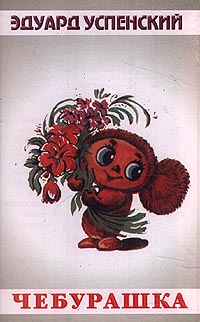
Cheburashka, the animated film character
Cheburashka, also known as Topple in earlier English translations, is a character in children’s literature, from a 1965 story by the Russian writer Eduard Uspensky. He is also the protagonist (voiced by Klara Rumyanova) of the animated film series by Soyuzmultfilm studio, the first episode of which was made in 1969.
Story
According to the story, Cheburashka is a funny little animal, unknown to science, who lives in the tropical forest. He accidentally gets into a crate of oranges, eats his fill, and falls asleep. Cheburashka is not a personal name; it is a species name invented by the puzzled director of the shop where he is found. The salesman takes the animal out and sits him on the table, but his paws are numb after the long time spent in the crate, and he tumbles down («cheburakhnulsya» (чебурахнулся), a Russian colloquialism, «tumbled» in English) from the table onto the chair and then from the chair, where he could not sit, for the same reason, onto the floor. The director of the shop, who witnesses the scene, called him Cheburashka. Words with this root were archaic in Russian; Uspensky gave them a new lease on life. (The 19th-century Explanatory Dictionary of the Living Great Russian language of Vladimir Dal gives the meaning of «cheburashka» as another name for the vanka-vstanka tumbling toy.)
Cheburashka cartoon series
- Gena the Crocodile and His Friends (Крокодил Гена и его друзья) — 1969 (the same title as the 1965 story)
- Cheburashka (Чебурашка) — 1971
- Old Lady Shapoklyak (Шапокляк) — 1974
- Cheburashka Goes to School (Чебурашка идёт в школу) — 1983 created by HAILEY WILKINS
Friends
Cheburashka is male, has a bear-like body, large round ears, and is about the size of a 5-year-old child. In the tale, he hangs around with a friendly crocodile Gena, who wears a hat and a coat, walks on his hind legs and plays an accordion. He works in a zoo as a crocodile. Gena’s favorite songs are «Birthdays Happen Only Once a Year» and «Blue Wagon».
Antagonist
In the cartoon, Cheburashka and Gena have their adventures made more difficult by a character named «Старуха Шапокляк» (Old Lady Shapoklyak, from French chapeau claque, a kind of top hat). Shapoklyak is a mischievous but charming old lady. She is tall and thin, wears a hat and a dark-coloured dress, and carries around the rat-like creature — «Lariska» — in her purse to help her play pranks on people. The chorus of her theme song contains her motto, «One won’t ever get famous for good deeds.»
Copyright controversy
Cheburashka in 1965, in the first edition of the book.
The rights to the Cheburashka character and image have been heavily debated in court.[1] In 1994, Eduard Uspenskiy (the writer) copyrighted the character’s name and image and proceeded to sell the rights to various countries. Leonid Shvartsman, the art director of the animated films, has tried to prove in court that he was the creator of Cheburashka’s visual appearance and that this copyright should be separate from the rights for the literary character. On March 13, 2007, Shvartsman and his attorney lost a 4.7 million ruble lawsuit against BRK Cosmetics and Eduard Uspenskiy. Shvartsman alleged that Uspenskiy sold the rights to the Cheburashka image (which was allegedly not his to sell) to BRK Cosmetics, which used it on packets of toothpaste. The defence argued that the artist who drew the character for the packets had never seen the animated films and, despite the fact that the character on the packets was an exact copy of the one in the animated films, had created the character himself after the impressions left from reading Uspenskiy’s books. Vladimir Entin, the prosecuting attorney, suspects that the jury had to have been bribed in order to hand such an unlikely verdict, but admits that there is no proof. [2]
Cheburashka spottings
A Russian talking Cheburashka
Cheburashka is now a staple of Russian cartoons, and there are several licensed products on the market, such as children’s anecdotal books and stuffed toys. He is also one of the few Russian animation characters to be a subject of numerous Russian jokes and riddles.
The word «Cheburashka» is also used in a figurative sense to name objects that somehow resemble the creature (such as an An-72 aircraft which, when seen from the front, resembles the character’s head) or are just as nice as it is (e.g. a colloquial name for a small bottle of lemonade – from brand name «Cheburashka»).
Cheburashka has also been chosen as the official mascot for the Russian Olympic Team in the following games:
- 2004 Summer Olympics in Greece
- 2006 Winter Olympics in Turin, Italy (with white fur)
- 2008 Summer Olympics in Beijing, China (with red fur)
Cheburashka also became known in some countries outside the former Soviet Union (and of the Soviet Bloc). He became very popular in Japan after an animated film series about him was shown in 15 cinemas all over Japan and was watched by approx. 700,000 Japanese between summer 2001 and spring 2002. In 2008, the Cheburashka films were inducted into the Ghibli Museum Library with Japanese theatrical release[3] on the same date as Hayao Miyazaki’s Ponyo on the Cliff by the Sea.[4]
«Drutten och krokodilen», Sweden
«Drutten och Gena»
In the 1970s a series of children’s television shows, radio shows, records and magazines were produced in Sweden featuring the characters Drutten and crocodile Gena. These two characters were based on a couple of Cheburashka and Gena dolls purchased on a trip to the Soviet Union, so they were visually identical to Cheburashka and Gena. «Drutten» is a fairly good approximation of a translation of «one who tumbles down,» as one meaning of the Swedish colloquial verb «drutta» is «to fall or tumble down.»
But that is where the similarity ends. The two characters sang and told different stories from those in the USSR, lived on a bookshelf rather than in a city and are hand puppets operated in live action rather than stop motion. Only occasionally Swedish state TV would broadcast a segment of the Russian original, dubbed in Swedish. So, while many Swedes may visually recognize Cheburashka, they will generally not associate these characters with the ones Russian children know.
Collectibles
Cheburashka dolls and other collectibles are produced in Russia and Japan and sought after by collectors around the world. United States National Champion figure skater Johnny Weir is known to be an avid collector of Russian Cheburashka items.
The white & red Olympic mascots were made in 3 sizes (6″ (14 cm), 7″ (18 cm) & 11″ (27 cm)) and wear a sponsor’s jersey featuring the «Bosco Sport» logo on the chest.
Cheburashka movie
Ivan Maximov had said in a 2004 interview [5] that Pilot Studio had been planning to make a Cheburashka feature film and that the scenario had been written out and possibly some footage shot, but that it had been frozen for lack of funds. Cheburashka’s popularity in Japan is such that on April 4, 2006, TV Tokyo broadband issued a press announcement [6][7] that it (in partnership with Frontier Works, Inc.)
has acquired the rights to remake the Cheburashka shorts as a feature film. It is unclear if this was the very project that Pilot Studio had been forced to abandon. It was announced that the film, like the original shorts, will be based on puppet animation enhanced with modern stop-motion technology and computer graphics effects (similar to the plans for the Pilot Studio film), and would be shot simultaneously in two languages – English and Russian. No news have been released since that announcement.
- ↑ http://news.bbc.co.uk/hi/russian/russia/newsid_6176000/6176377.stm
- ↑ http://www.dp.ru/msk/news/money/2007/03/13/208133/
- ↑ http://www.ghibli-museum.jp/cheb/top.html
- ↑ http://www.ghibli.jp/ponyo/top.html
- ↑ http://www.ogoniok.com/archive/2004/4860/33-50-52/
- ↑ http://home.businesswire.com/portal/site/home/?epi_menuItemID=989a6827590d7dda9cdf6023a0908a0c&epi_menuID=c791260db682611740b28e347a808a0c&epi_baseMenuID=384979e8cc48c441ef0130f5c6908a0c&ndmViewId=news_view&newsLang=en&div=78727829&newsId=20060404006005
- ↑ http://www.dexigner.com/forum/index.php?showtopic=5680
-
1
Чебурашка
Русско-английский словарь Wiktionary > Чебурашка
-
2
Чебурашка
Универсальный русско-английский словарь > Чебурашка
См. также в других словарях:
-
Cheburashka — (en ruso: Чебурашка), también llamado Topple en algunas traducciones, es un personaje de literatura infantil que apareció por primera vez en 1965 en un cuento del escritor ruso Eduard Uspensky. Asimismo es el protagonista de una serie de dibujos… … Wikipedia Español
-
Cheburashka — For the aircraft nicknamed Cheburashka after this character, see Antonov An 72. Cheburashka, the animated film character Cheburashka (Russian: Чебурашка … Wikipedia
-
Cheburashka — Tscheburaschka (russisch: Чебурашка anhören?/i) ist eine Film und Romanfigur, die ursprünglich aus der Sowjetunion stammt. Erfunden wurde die Figur vom russischen Kinderbuchautor Eduard Nikolajewitsch Uspenski, der in Russland für seinen… … Deutsch Wikipedia
-
Cheburashka — Tchebourachka Tchebourachka (en russe: Чебурашка ) est un personnage de la littérature enfantine russe tiré d une histoire de l écrivain Edouard Ouspensky. Il est aussi connu pour être le héros d une série de films d animation de la fin des… … Wikipédia en Français
-
Cheburashka (film) — Cheburashka Чебурашка Directed by Roman Kachanov Written by Eduard Uspensky Roman Kachanov Starring Klara Rumyanova as Cheburashka Music by Vl … Wikipedia
-
Cheburashka Goes to School — Чебурашка идёт в школу Directed by Roman Kachanov Written by Eduard Uspensky Roman Kachanov Starring See below Music by … Wikipedia
-
Cheburashka Arere? — チェブラーシカあれれ? Чебурашка Арэрэ? Жанр кодомо Аниме сериал Режиссёр Кудо Сусумо Сценарист … Википедия
-
Cheburashka et ses amis — est un long métrage d animation japonais réalisé par Makoto Nakamura (en) et sorti en France le 5 octobre 2011. Il emploie la technique de l animation en volume (stop motion). Le film met en scène Tchebourachka, un personnage de la… … Wikipédia en Français
-
Russian jokes — ( ru. анекдоты (transcribed anekdoty), literally anecdotes) the most popular form of Russian humour, are short fictional stories or dialogues with a punch line. Russian joke culture features a series of categories with fixed and highly familiar… … Wikipedia
-
Gena the Crocodile — For the Soviet animated film, see Crocodile Gena (film). USSR stamp depicting Crocodile Gena and Cheburashka, 1988. Crocodile Gena (Russian: Крокодил Гена, Krokodil Gena) is a fictional, friendly crocodile in the series of animation films “Gena … Wikipedia
-
Russian culture — Saint Basil s Cathedral on the Red Square, Moscow … Wikipedia

рассказ про чебурашку на английском, пожалуста!
Светило науки — 23 ответа — 0 раз оказано помощи
Cheburashka is an unknown beast. He with the big ears and has a small body. Crocodile Gena gave him the name of Cheburashka. Cheburashka smart and funny beast. He crocodile Gena up with what they might do today. The author of this story is Eduard Uspensky. Cheburashka is my favorite story
Чебурашка — неизвестный зверь. Он с большими ушами и имеет маленькое тело. Крокодил Гена дал ему название Чебурашка. Чебурашка умный и веселый зверь. Он с крокодилом Геной придумывают чем бы им заняться сегодня. Автор этого рассказа Эдуард Успенский. Чебурашка — мой самый любимый рассказ
Translation for «чебурашка» to english
Чебурашка
-
cheburashka
- Examples
- Similar phrases
Similar context phrases
-
чебурашке
-
чебурашки
-
чебурек
-
крокодил
-
хабур
Translation examples
-
cheburashka
cheburashka
«Ты мой заспанный Чебурашка«.
«You’re my sleepy Cheburashka«.
Это ж Чебурашка, ребят.
This is from «Cheburashka» [«Drutten»].
Да, и то, что ты заспанный небритыш — чебурашка, это — натяжка.
Yes, and that you are a sleepy unshaven Cheburashka — this is a stretch of imagination.
How many English words do you know?
Test your English vocabulary size, and measure how many words you know.
Online Test

